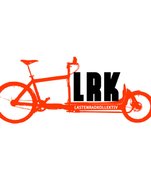MONDAY 20 MARCH 2017 - 11:30 to 13:00 SESSION 1 - SHOWCASE
C: Municipalities & the private use of cargo bikes Panel discussion
Martin Blum, Director, Mobilitätsagentur Wien, Austria (Session Moderator)
Vienna is growing rapidly. At the end of 2015, the city had about 30,000 inhabitants more than a year before. For Vienna to remain a great place to live and to achieve its climate protection goals, it is necessary to change our travel habits. The city of Vienna has set itself the goal of significantly increasing the proportion of people walking and cycling. The Mobility Agency Vienna was founded in 2011 to promote cycling and, since 2013, walking, with campaigns, awareness-raising, services and innovative projects. The Mobility Agency is the first point of contact for anyone with suggestions for improvements to pedestrian or bicycle routes. As an intermediary between citizens, the administration and politicians, the Agency works to make walking and cycling in the city easier, more comfortable and safer.
More about Mobilitätsagentur Wien here.
Lukas Lang, Wien 3420 Aspern Development, Vienna, Austria (C1)
Lukas is a project manager for urban planning and mobility at the agency responsible for the development of Aspern Die Seestadt Wiens. Aspern Seestadt is one of Europe’s largest urban development areas and is built in the northeast of the city of Vienna. Lukas helps to push urban mobility forward in Seestadt to create a city of short distances as well as to provide a wide range of mobility options. He was also responsible for the implementation of the world-wide first fully-automatic cargo bike sharing system.
.
Kathrin Grotrian, Canton of Basel-Stadt, Dept of Public Works and Transport, Basel, Switzerland (C2)
After her graduation as an industrial engineer, specialized on traffic and transportation planning, Kathrin Grotrian was working five years in a traffic consultancy in Basel and additional five years for the Department of Traffic of the Canton of Zürich. Since 2008 Kathrin Grotrian has been working for the Department of Public Works and Transport of the Canton of Basel-Stadt. There she is responsible for traffic censuses for all means of transport and mobility management projects.
Konrad Berghuber, Vienna Cargo Bike Collective LRK, Vienna, Austria (C3)
Konrad Berghuber is co-founder of the Vienna Cargo Bike Collective. He works theoretically and practically on commons and on collective forms of social organisation. The Vienna Cargo Bike Collective provides an easy assessable infrastructure of cargo bikes and trailers to the Viennese population. It is based on voluntary donation and on mutual aid. It enables the transport of goods without using fossil fuel. It animates people to use cargo bikes instead of cars or trucks and it is linked to the struggle for a bike friendly city.
Jonas Schmid, Mobiltätsakademie AG, Bern, Switzerland (C4)
Jonas Schmid is a project manager and senior researcher of the Bern-based Mobility Academy, which was founded by Touring Club of Switzerland in 2007. As a think tank for mobility, the Mobility Academy deals with important trends in sustainable transport: electrification of motorized transport, emergence of collaborative mobility services, and the renaissance of the bicycle in urban mobility. Together with his team, Jonas currently implements a national programme for cargobike-promotion with its flagship project called carvelo2go, a very successful platform for cargobike-sharing. Jonas studied geography at the University of Lausanne with a focus on mobility and transport issues.
Dennis Steinsiek, Nextbike, Leipzig, Germany (C5)
Dennis studied sustainable development in two of the most livable cities of the world: Utrecht and Copenhagen. His goal is to bring the good practices of those cities into other cities. As a senior moblitiy consultant at nextbike he works closely together with city councils, transport companies and universities to integrate public bike sharing schemes into the existing public transport mix. Also he tries to integrate other types of bicycles like kids- and cargo-bikes in public bike sharing schemes in order to offer a good choice for the 99%.







